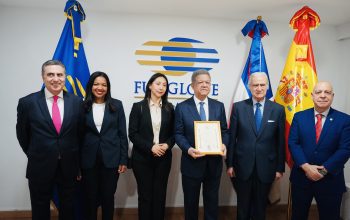news
GFDD and FUNGLODE Participate in UN DPI/NGO Forum, “NGOs Responding to Crisis: Meeting New Challenges, the Case of Haiti”
March 1, 2010
On February 24, Global Foundation for Democracy and Development (GFDD) and Fundación Global Democracia y Desarrollo (FUNGLODE) participated in the UN DPI/NGO workshop, “NGOs Responding to Crisis: Meeting New Challenges, the Case of Haiti,” that was held at the United Nations Headquarters in New York City. The purpose of the forum was to inform civil society representatives of the
efforts taking place on the ground by NGOs to address the widespread tragedy and destruction that transpired due to the earthquake.
Key note presentations were given by: Jean-Wesley Cazeau, Ambassador of Haiti to the UN; Nicholas Reader, Deputy Spokesperson/Public Information Officer, Public Information Unit, Communications and Information Services Branch, United Nations Office for the Coordination of Humanitarian Affairs (OCHA); Patrick McCormick, Emergencies
Communication Officer, Media Section, UNICEF; Jocelyn McCalla, President/CEO, JMC Strategies LLC; David Stillman, Executive Director, Public-Private Alliance Foundation; and Patricia Sacristan, Young People for International Cooperation Chair, Southern New York Division, United Nations Association of the United States of America. The panel was moderated by Gail Bindley-Taylor Sainté, Information Officer, NGO Relations, Department of Public Information (DPI).
The quake, which killed as many as 250,000 people and left behind as much as 13.2 billion dollars in damages (Wall Street Journal, February 18), bears the deadliest toll to date on a UN peace-keeping mission. According to panelists, since the disaster’s wake, coordination and distribution of aid has improved, and help is now reaching more people. Ambassador Jean-Wesley Cazeau acknowledged the significant contribution by the approximately 8,000 NGOs on the ground
to daily life in Haiti, prior and in the days following the travesty. He also emphasized how important it is for NGOs to communicate with the government about the work they are realizing to ensure that national priorities are being met to the best degree possible.
Stakeholders expressed that while life for Haitians is in some way normalizing – airports and ports are open; cell phones are working; electricity has been restored, despite being rationed; school
classes and other public and private services have resumed – the road to recovery will be a long one. All concurred that the process to rebuild a better Haiti would take upwards of ten years, underscoring the need to keep international attention focused on the island nation throughout the course of its recovery.
Development experts identified temporary housing, camp management, rebuilding of physical infrastructure and lack of government infrastructure in the
areas of sanitation, health and education to be the most substantial obstacles to the country’s post-earthquake development. Protecting children that have lost caregivers or have been separated from caregivers was also a top challenge voiced by panelists.
Nicolas Reader insisted that NGO and UN agency response to the Haitian disaster in terms of coordination, in comparison to the Asian Tsunami of December 2005, had improved in measurable ways.
According to Reader, 4 million people have received food and clean water and continue to do so, on a targeted basis.
David Stillman, Executive Director of the Public-Private Alliance Foundation’s, an organization that works to establish partnerships between governments, non-governmental and civil society institutions and the private sector to advance sustainable development in Haiti, the Dominican Republic and Madagascar, discussed PPAF’s ongoing
interest in promoting and solidifying cooperation between Dominican and Haitian institutions and the international community. He discussed his organization’s core work in the areas of agro-fisheries, sustainable agriculture, biofuels, small and medium business enterprise and corporate social responsibility and outlined disaster response initiatives being spearheaded by PPAF to get prefabricated housing and small cook-stoves to those in need.
In their closing
remarks, panelists reiterated the importance of guaranteeing that good will towards Haiti does not dissipate, but remains strong.
Global Foundation for Democracy and Development (GFDD) and Fundación Global Democracia y Desarrollo (FUNGLODE) stand in solidarity with the people of Haiti. To find out how you can help, see listing of Dominican institutions contributing to relief efforts: http://www.dominicanaonline.org/portal/english/cpo_noti2199.asp.
GFDD and FUNGLODE support the United Nations and its different agencies in carrying out their missions and achieving their goals. In 2004, GFDD and FUNGLODE were admitted to the United Nations System as institutions with consultative status, joining the Economic and Social Council (ECOSOC), the United Nations Conference on
Trade and Development (UNCTAD), the Department of Public Information (DPI), the Global Compact Office (UNGC), the Office on Drugs and Crime (UNODC) and the World Summit on the Information Society (WSIS).
GFDD and FUNGLODE attend seminars and conferences about issues impacting the global community in order to remain at the forefront of academic debate and network with renowned experts, as part of their mission to bring world-class programs concerning social and economic
development and democratization to the Dominican Republic.
Related links:
http://ochaonline.un.org/
http://www.unasouthernny.org/
http://www.ppafoundation.org/
http://www.unicef.org/






